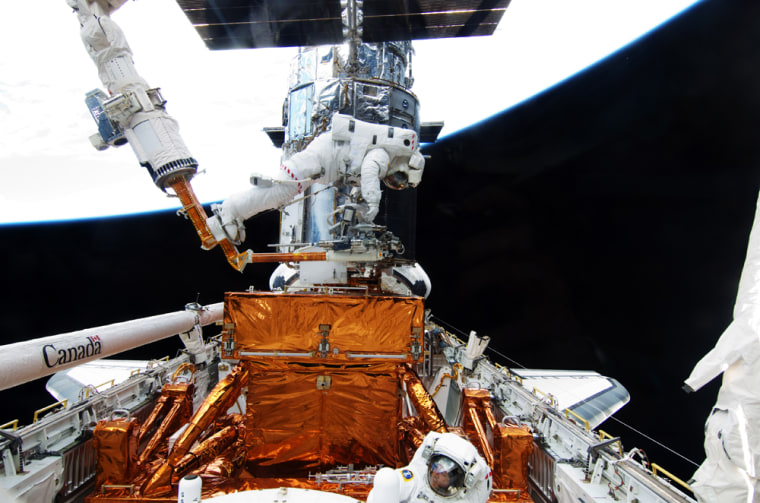When Atlantis returned to Earth on Sunday, it didn't just cap off a mission to Hubble — it marked the end of the servicing era.
The astronauts' fifth overhaul of the Hubble Space Telescope was the last planned mission to repair the telescope, or any satellite for that matter. And if NASA retires the space shuttle fleet in 2010 as planned, the agency will lose the ability to visit orbiting spacecraft and repair them in space.
"This is the last scheduled servicing mission of Hubble with the space shuttle, and what I think it's demonstrated is the extreme utility of having people working in space and accomplishing things that are different than what was expected," said astronaut John Grunsfeld, who has helped fix Hubble on three different missions, from space Wednesday.
The first in-space fix by shuttle astronauts was in 1984, when spaceflyers repaired the sun-watching SolarMax satellite. In all, there have been 10 space repair missions by shuttle crews, half of them to Hubble.
This kind of servicing has been a major source of pride for NASA — most notably in 1993 when astronauts successfully installed an instrument on Hubble to fix a flawed mirror that had been built into the telescope. If the agency hadn't been able to do in-space repairs back then, Hubble's pictures might have remained blurry, and the observatory would have been an embarrassment instead of the champion that it is.
"To go out in a spacesuit and perform the extraordinarily intricate operations that we see, and do it successfully — I think that is one of the most remarkable achievements that NASA has ever done," Hubble project scientist David Leckrone said at a briefing this week. "I think that is just one of the most valuable things that NASA has learned how to do. And it just makes me want to cry to think that this is the end of it."
NASA's replacement spaceship, the Orion Crew Module (which will fly aboard Ares rockets), will not have the ability to rendezvous with Hubble or other satellites to repair them. That vehicle is designed to carry humans back to the moon and on to Mars, but has no built-in ability to do repair work closer to home, and does not have a large cargo bay like the shuttle's to carry up new instruments and tools.
"I'm talking about the long-term loss of hard-won capability and costly capability," Leckrone said. "If there's a future for this agency it's got to be in an innovative direction like that."
Leckrone criticized the design of Orion, which is part of the Constellation program, for not building in this capability.
Besides NASA, no other space agency has spacecraft designed for in-space servicing. Once the space shuttles retire, the world will be incapable of repairing Hubble or other orbiting spacecraft, should they need it.
"There is no person out there, there is no leadership out there, there is no vision out there to pick up the baton that we're about to hand off and carry it forward," Leckrone said. "And I think that's just a shame to abandon one of the most impressive, refined, sophisticated capabilities that this agency as a whole — human side and robotic side — has achieved."
Some might argue that NASA still has some servicing ability, though.
"Every single day on the International Space Station, some kind of maintenance is done with people, and we do spacewalks on the International Space Station as well," Grunsfeld said. "So NASA's mission to further these techniques I think will only increase with the International Space Station as it has on Hubble."
The Atlantis astronauts, the last humans ever to touch or see Hubble up close, are slated to land early Saturday. Rain in Florida prevented a Friday landing.
